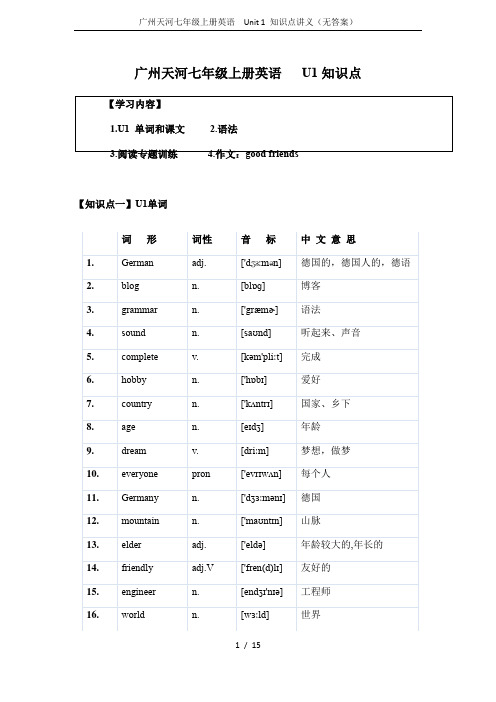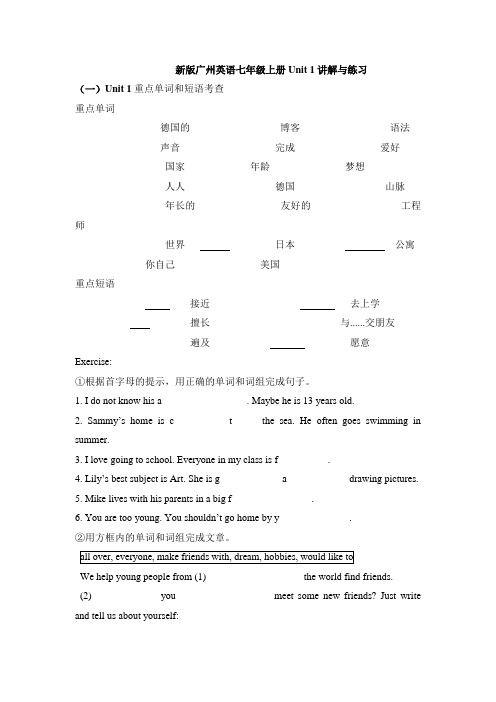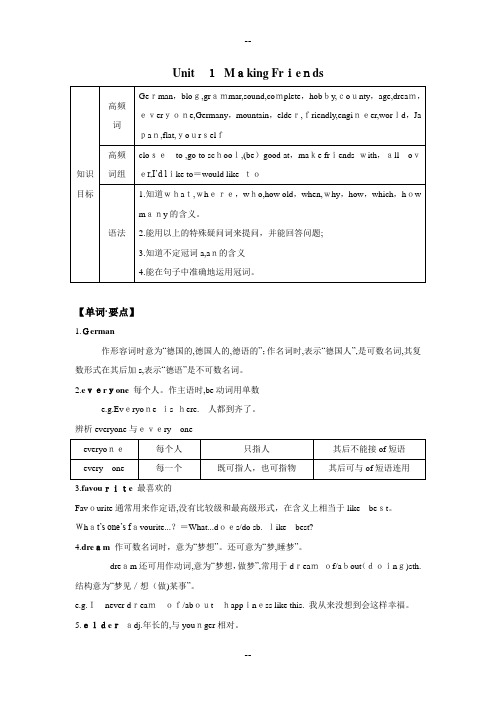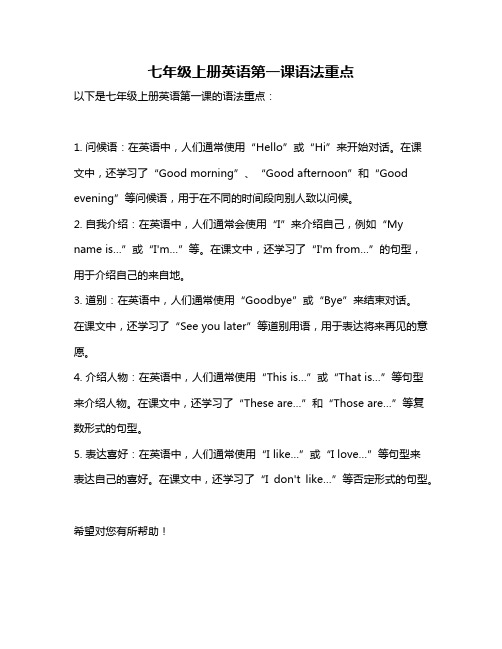广州版七年级上unit1 语法知识讲解
广州新版七年级英语上册unit1-讲义

腾飞教育初一英语上讲义第一讲Unit1 Making friendsName: Mark:一、课文单词与短语German adj. 德国的 blog n. 博客 grammar n. 语法sound n. 声音 complete v. 完成 hobby n. 爱好country n. 国家 age n. 年龄 dream n. 梦想everyone pron. 人人,所有人 Germany adj. 德国mountain n. 山;山脉 elder adj. 年长的 friendly adj. 友好的engineer n. 工程师world n. 世界 Japan n. 日本 flat n. 公寓yourself pron. 你自己. US 美国close to (在空间,时间上)接近 go to school 去上学(be) good at 擅长 make friends with 与…….交朋友all over 遍及‘d like to =would like to 愿意二、课文内容精析1. Welcome to my blog. welcome to sp. 欢迎来到某地2. I’m from Germany. 我来自德国。
be from= come from 来自Germany 德国 German adj. 德国的 n.德语;德国人(two Germans)German cars are very good. She was born in Germany.The Germans speak English very well.3. I’m 11 years old. 我十一岁。
问句:What is his age = How old is he 他多大了1) at the age of= when sb. was … years old 在……岁的时候He could swim at the age of six. = He could swim when he was six years old2)the same age of = as old as 和……一样大She is the same age of Kate. = She is as old as Kate.(注意:the same height as = as tall as 和……一样高; the same length as = as long as 和……一样长)4. I have long hair. 我有长头发。
广州天河七年级上册英语 Unit 1 知识点讲义(无答案)

广州天河七年级上册英语U1知识点【知识点一】U1单词【单词填空】1)The f__________has four small rooms and a bright kitchen.2)The s________of car died away(消失)in the distance.3)My h___________is collecting stamps. What about you?4)There are some stone house at the foot of the m___________.5)Nobody can c_____________this task in a week. It is too difficult.6)China is the most populous (人口多的)c______________on Earth.7)Mr Black is from Germany. So he gives us G___________lesson Every Monday.8)My teacher found me many mistakes in spelling and g___________ in mycomposition.(作文)9)Harry is my e_________brother. He is two years older than me.10)My d is to be an engineer.【知识点二】课文一、在课文中找出新单词、短语、句型,用不同颜色荧光笔标出来并翻译。
二、按照原文意思填空。
My name is Anna. I come (1) _________ Germany. I am tall and thin (2) ________ long hair. I live with my family in a house close to some mountains. My mum is (3) ______ Art teacher and my dad is a doctor. I have an elder sister and an elder brother.I go to school by school bus every day. My favourite (4) _________ (subject) areMaths, Art and Science. I like my school very much because the teachers are very (5) _________ (friend). My dream is (6) _____________ (be) an engineer. I like many sports. I am good at (7) ___________ (swim) and playing basketball. (8) __________ (this) are my favourite hobbies.I want to make (9) __________ (friend) with young people from all over the world! Email (10) _______, please!【知识点三】语言点1.would like to do sth 想要做某事 =want to do sthe.g:I would like to go shopping with my mother.=I want to go shopping with my mother. 我想要跟我妈妈一起去购物。
新版广州英语七年级上册Unit1讲解与练习

新版广州英语七年级上册Unit 1讲解与练习(一)Unit 1重点单词和短语考查重点单词_________________德国的__________________博客__________________语法_________________声音__________________ 完成_________________爱好__________________国家_____________年龄_______________梦想__________________人人__________________德国__________________山脉__________________年长的_________________友好的__________________工程师__________________世界___ _________日本__________ __公寓______________你自己_________________美国重点短语______________ ____接近________________ __ 去上学___________ _______ 擅长________________________与......交朋友_______________________遍及__________ ________ 愿意Exercise:①根据首字母的提示,用正确的单词和词组完成句子。
1. I do not know his a_________________. Maybe he is 13 years old.2. Sammy’s home is c__________ t_____ the sea. He often goes swimming in summer.3. I love going to school. Everyone in my class is f__________.4. Lily’s best subject is Art. She is g____________ a____________ drawing pictures.5. Mike lives with his parents in a big f________________.6. You are too young. You shouldn’t go home by y______________.②用方框内的单词和词组完成文章。
新广州牛津版初一英语上册知识汇总及练习

3.favourite 最喜欢的Favourite通常用来作定语,没有比较级和最高级形式,在含义上相当于like best。
What’s one’s favourite...?=What...does/do sb. like best?4.dream作可数名词时,意为“梦想”。
还可意为“梦,睡梦”。
dream还可用作动词,意为“梦想,做梦”,常用于dreamof/about(doing)sth.结构意为“梦见/想(做)某事”。
e.g.Inever dreamof/abouthappiness like this. 我从来没想到会这样幸福。
5.elderadj.年长的,与younger相对。
9.enjoy 及物动词,意为”喜欢,享受....”,后常接名词、代词或动名词作宾语。
10.need①作实义动词时,意为“需要”,有人称、数和时态的变化,其后常接名词、代词或不定式作宾语。
need to dosth. 需要做某事。
e.g.Weneed some water.②作情态动词时,意为“需要”,无时态和人称的变化,常用于疑问句和否定句中,其后跟动词原形。
need用于一般疑问句是,肯定回答用must,否定回答用needn’t。
回答以must开Ex.Lily and hersisterlookthe same. I can’ttell one from .A.other B.theothers C.the other D.others【短语·要点】1.play basketball打篮球。
在英语中,表示进行某种球类运动时,直接用“play+表示球类的单数名词”即可,在球类运动名词前不加任何冠词。
Play后接西洋乐器类名词时,表示“演奏....”,在西洋乐器类名词前必须加定冠词the。
Ex. Billlikes playing volleyball,buthe doesn’tlikeplaying piano.A.the;theB./;theC.the;/2.be good at意为“擅长....”,后接名词、代词或动名词,同义词组为dowell in。
(真诚推荐)广州版七年级英语上册 unit1 语法 特殊疑问句,冠词及单元重点短语和练习

广州七年级英语上语法Unit 1 特殊疑问句冠词疑问代词的练习单项选择疑问代词的练习冠词练习Unit1重点短语play 在于棋类、球类等运动搭配时名词不用加定冠词the。
1.My hobby is playing chess. 1.我的爱好是下棋。
work as担任……工作2.He works as an accountant in London. 2.他在伦敦当会计师。
be keen on热衷于3.I am keen on sports 3.我热衷于体育运动。
4.He is keen on music. 4.他热衷于音乐。
enjoy doing sth. 喜欢做某事5.She enjoys playing the piano after school. 5.他喜欢放学后弹钢琴。
(be )in glasses= wear glasses戴着眼镜6.She is in glasses= She wears glasses. 6.她戴着眼镜。
be happy to do sth.很高兴做某事7.I’m happy to be your penfriend. 7.我很乐意左你的笔友。
8.Thery’re happy to help us. 8.他们很乐意帮我们的忙。
拓展:be + adj. +to do sth. 做某事感到……be good at 擅长于……9.I’m good at English. 9.我英语很好。
why not 何不……?1.Why not stay here for another week? 1.何不在这里再待一周?such as 比如2.I have many hobbies such as fishing and swimming.2.我有很多爱好,不如钓鱼和游泳。
for example 例如3.Many boys in our class , for example , John and Paul , are good at playing basketball .3.我们班上很多男生,例如约翰和保罗,篮球打得很好。
广州版英语七年级上册第一单元知识点总结

7A UNIT 1 Making friendsⅠ重点单词:World n. 世界country n.国家Japan n.日本Germany n.德国German adj.德国的n.德国人grammar n.语法blog n.博客sound n. 声音Everyone n.人人(谓语动词要用单数)Hobby n.爱好(复数hobbies)age n. 年龄elder adj. 年长的dream n.梦想complete v.完成Us pron.我们yourself pron.你自己friendly adj. 友爱的engineer n.工程师flat n.公寓mountain n. 山Ⅰ重点短语:1.colse to 接近= near 反义词:far (away)from 远离2.Go to school 去上学3.Be good at 擅长=do well in 反义词:be bad /poor at=do badly in不擅长4.Make friends with 与……交朋友make friends 交朋友5.All over遍及6.I’d like to=would like to 愿意Ⅰ 重点句型:1.what does···mean?2.welcome to3.I like···because···4.My dream is to be··?5.How old is/are ····?6.What does ····do?详细讲解:1.Read a German girl’s blog。
(Page1)(1)German :① adj.德国的(德国人的,德语的)This is a German car。
七年级上册英语第一课语法重点

七年级上册英语第一课语法重点
以下是七年级上册英语第一课的语法重点:
1. 问候语:在英语中,人们通常使用“Hello”或“Hi”来开始对话。
在课
文中,还学习了“Good morning”、“Good afternoon”和“Good evening”等问候语,用于在不同的时间段向别人致以问候。
2. 自我介绍:在英语中,人们通常会使用“I”来介绍自己,例如“My name is…”或“I'm…”等。
在课文中,还学习了“I'm from…”的句型,
用于介绍自己的来自地。
3. 道别:在英语中,人们通常使用“Goodbye”或“Bye”来结束对话。
在课文中,还学习了“See you later”等道别用语,用于表达将来再见的意愿。
4. 介绍人物:在英语中,人们通常使用“This is…”或“That is…”等句型来介绍人物。
在课文中,还学习了“These are…”和“Those are…”等复数形式的句型。
5. 表达喜好:在英语中,人们通常使用“I like…”或“I love…”等句型来
表达自己的喜好。
在课文中,还学习了“I don't like…”等否定形式的句型。
希望对您有所帮助!。
广州初一英语上U1语法

A 1)What? 2)Where? 3)When? B a) numbers b) ages c) things
4)How old?
5)How many?
d) times
e) places
பைடு நூலகம்
特殊疑问句的回答:
特殊疑问句不能用yes或no来回答, 要根据问句的内容如实回答。如: -- How many people are there in your family? -- There are five. -- Where did you go last Sunday? -- To the park.
family?
6.What does your father do?
LOGO
特殊疑问句要点
- 1、下载文档前请自行甄别文档内容的完整性,平台不提供额外的编辑、内容补充、找答案等附加服务。
- 2、"仅部分预览"的文档,不可在线预览部分如存在完整性等问题,可反馈申请退款(可完整预览的文档不适用该条件!)。
- 3、如文档侵犯您的权益,请联系客服反馈,我们会尽快为您处理(人工客服工作时间:9:00-18:30)。
Unit 1 Making friendsUNIT 1 单词German adj. 德国的blog n. 博客grammar n. 语法sound n. 声音complete v. 完成hobby n. 爱好country n. 国家age n. 年龄dream n. 梦想everyone pron. 人人,所有人Germany adj. 德国mountain n. 山;山脉elder adj. 年长的friendly adj. 友好的engineer n. 工程师world n. 世界Japan n. 日本flat n. 公寓yourself pron 你自己.US 美国短语close to (在空间,时间上)接近go to school 去上学(be) good at 擅长make friends with 与…….交朋友all over 遍及…d like to =would like to 愿意二.句型及语法1.谈论喜好:enjoy (doing) sth. be keen on (doing) sth. My (favourite) hobby is …(doing)…like to do / doing sth. would like to do(‟d like to do) = want to doI would like to be your pen-friend. 我想成为你的笔友。
I am interested in drawing. 我对画画感兴趣。
I am keen on drawing. 我热衷于画画。
I enjoy drawing. 我喜欢画画。
My favourite hobby is drawing. 我喜欢画画。
典例分析特殊疑问句要点:1)改句时,原句中如有助动词(be, can, must, shall, will等)的,把第一个助动词提前;没助动词的,加do(各时态)2)对主语提问时,用what或who代替划线部分,动词不变,如:Jim works hardest in our class. →Who works hardest in your class?3)对形容词、副词、及表方式的介词短语提问,用howPeople work out difficult problems with computers. →How do people work out difficult problems?4)对频率(如once a week, twice a month, )提问,用how oftenI visit my grandparents twice a month. →How often do you visit your grandparents?5)对看不见的原因提问,用why; 回答用because.Why do you late for school ? Because my bike is broken on the way.6) 对时间提问,用when;When do you get up?7) 询问“哪一个”用which.Which one do you prefer, the red one or the green one ?你更喜欢哪一个,红色的那件还是绿色的那件?8)Those books are Lily‟s.(问归属)are those books?堂上训练:练习:对下列句子的划线部分提问1. That car is red. _____ _____ is that car?2. My sister is 20 years old. ______ _____ is your sister?3. The glasses are Jim’s. ______ glasses are these?4. Tom collected eggs last Sunday. ______ collected eggs last Sunday?5. There were eleven books in my bag.______ ______ books are there in your bag?6. We visited our teachers on Teacher’s Day. _______ did you visit your teachers?7. It means “Do not touch”._______ does it mean?8. I’m fine, thank you.______ are you?9. We go to school by bus.______ do you go to school?10.We go to school five times a week._______ ______ do you go to school?二、对下列句子的划线部分提问,将答案写在横线上。
1. My name is Mary.((划提)2. My shirt is white.(划提)3. That is your suit. (划提)4. This is my umbrella.(划提)5. It‟s a V olvo. (划提)6. He is an office assistant.(划提)7.He is American. (划提)知识回顾:冠词:不定冠词的用法冠词是虚词,本身不能单独使用,也没有词义,它用在名词的前面,帮助指明名词的含义。
英语中的冠词有三种,一种是定冠词(the Definite Article),另一种是不定冠词(the Indefinite Article),还有一种是零冠词(Zero Article)。
不定冠词a(an)与数词one 同源,是“一个”的意思。
a用于辅音音素前,一般读作[e],而an则用于元音音素前,一般读做[en]。
1)表示“一个”,意为one;指某人或某物,意为a certain。
A Mr. Ling is waiting for you.2)代表一类人或物。
A knife is a tool for cutting with.Mr. Smith is an engineer.3)词组或成语。
a little / a few / a lot / a type of / a pile / a great many / many a / as a rule / in a hurry / in a minute / in a word / in a short while / after a while / have a cold / have a try / keep an eye on / all of a sudden定冠词的用法定冠词the与指示代词this,that同源,有“那(这)个”的意思,但较弱,可以和一个名词连用,来表示某个或某些特定的人或东西。
1)特指双方都明白的人或物:Take the medicine.把药吃了。
2)上文提到过的人或事:He bought a house.I‟ve been to the house.他买了幢房子。
我去过那幢房子。
3)指世上独一物二的事物:the sun,the sky,the moon,the earth4)单数名词连用表示一类事物:如:the dollar 美元;the fox 狐狸;或与形容词或分词连用,表示一类人:the rich 富人;the living 生者。
5)用在序数词和形容词最高级,及形容词only,very,same等前面:Where do you live?I live on the second floor. 你住在哪?我住在二层。
That‟s the very thing I‟ve been looking for. 那正是我要找的东西。
6)与复数名词连用,指整个群体:They are the teachers of this school.指全体教师)They are teachers of this school. (指部分教师)7)表示所有,相当于物主代词,用在表示身体部位的名词前:She caught me by the arm……她抓住了我的手臂。
8)用在某些由普通名词构成的国家名称、机关团体、阶级、等专有名词前:the People‟s Republic of China中华人民共和国the United States美国9)用在表示乐器的名词之前:She plays the piano.她会弹钢琴。
10)用在姓氏的复数名词之前,表示一家人:the Greens格林一家人(或格林夫妇)11)用在惯用语中:in the day,in the morning (afternoon,evening),the day after tomorrowthe day before yesterday,the next morning,in the sky (water,field,country)in the dark,in the rain,in the distance,in the middle (of),in the end,on the whole,by the way,go to the theatre零冠词的用法1)国名,人名前通常不用定冠词:England,Mary;2)泛指的复数名词,表示一类人或事物时,可不用定冠词;They are teachers. 他们是教师。
3)抽象名词表示一般概念时,通常不加冠词;Failure is the mother of success.失败乃成功之母。
4)物质名词表示一般概念时,通常不加冠词,当表示特定的意思时,需要加定冠词;Man cannot live without water.人离开水就无法生存。
5)在季节、月份、节日、假日、日期、星期等表示时间的名词之前,不加冠词;We go to school from Monday to Friday. 我们从星期一到星期五都上课。
6)在称呼或表示官衔,职位的名词前不加冠词;The guards took the American to General Lee.士兵们把这个美国人送到李将军那里。
7)在三餐、球类运动和娱乐运动的名称前,不加冠词;如:have breakfast,play chess8)当两个或两个以上名词并用时,常省去冠词;I can‟t write without pen or pencil.没有钢笔和铅笔,我就写不了字。
